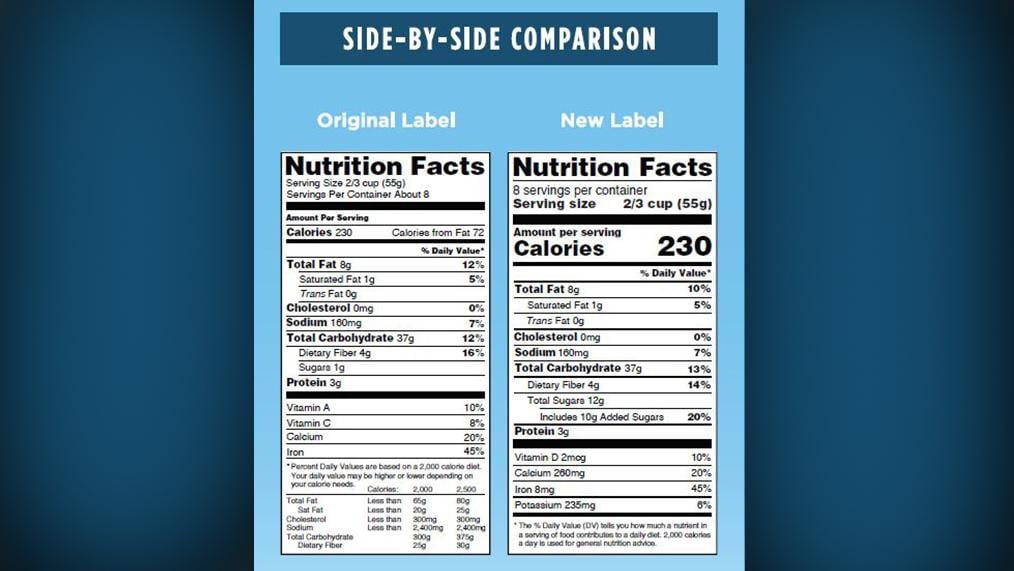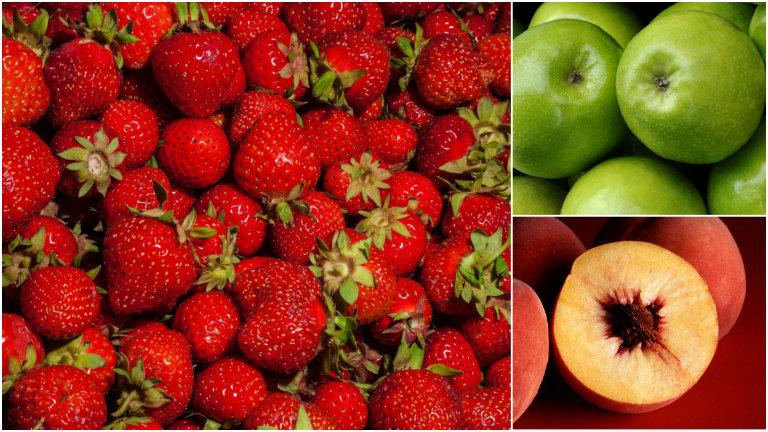With the backing of first lady Michelle Obama, the Food and Drug Administation announced Friday the first major changes to food nutrition labels since the early 1990s. But not everyone was on board: Some food makers and the sugar industry fought the revisions.
The updated labels will highlight “calories,” and “servings” and will be much bigger. The FDA has also tweaked the serving sizes to more closely reflect the amounts of food that people actually eat. That’s changed significantly since the serving size requirements were published in 1993. The most controversial aspect of the new labels is the declaration of grams and a percent daily value (%DV) for “added sugars” to help consumers know how much sugar has been added to the product.
“This is going to make a real difference in providing families across the country the information they need to make healthy choices,” Michelle Obama said in a statement.
So will the new information about sugar content, calorie counts and adjusted serving sizes help people with their diets and consumption or do most people ignore food labels?
Dr. Lisa Neff is an assistant professor of endocrinology, metabolism and molecular medicine at Northwestern Medicine. She is also certified by the American Board of Physician Nutrition Specialists and is an active member of the Obesity Society and the American Society for Nutrition.
“Although food labels may not be the sole solution to the obesity epidemic that we’re seeing in this country, they can empower individual patients or people to make informed decisions when they go to the grocery store or to restaurants,” said Dr. Neff, who helps her patients manage nutritional disorders and weight-related metabolic disorders, including Type 2 diabetes and metabolic syndrome.
Omri Ben-Shahar, a professor with the University of Chicago Law School, is an expert in consumer protection and the author of "More Than You Wanted to Know: The Failure of Mandated Disclosure." His recent article in Forbes calls food labeling a failure.
“Everybody wants to eat better. The problem is, [food labeling] has been going on for about 20 years, and we don’t see any change in the eating habits of people,” Ben-Shahar said. “The task of improving one's eating is not just solved through better information.”
 Click to enlarge (Courtesy of the Food and Drug Administration)
Click to enlarge (Courtesy of the Food and Drug Administration)
Dr. Neff said that Americans’ growing waistlines can be attributed in part to changes in eating habits and to the food and beverage industry.
“More Americans are eating food outside of the home,” she said. “Food labels are just one piece, and education is a big part of it. But individuals are going to have to have the information and be able to interpret it. The new food labels are a step in the right direction.”
“I hate to be the party spoiler, but I don't think that this new label will do anything,” Ben-Sahar said. He argues that people know when they’re “doing something that is not going to help their diet” and that nutrition labels are ignored not because the information isn’t clear enough, but because of other factors, such as willpower, hunger and even the price of certain types of food.
“I’m not sure that the government can help people in this,” he said. “This is a private issue that we have to tackle.”
“Obesity and weight gain is a very complicated condition and disorder,” said Dr. Neff. “It really can't be distilled down just to a question of willpower.”
Sign up for our morning newsletter to get all of our stories delivered to your mailbox each weekday.
Related Stories from “Chicago Tonight”
 Strawberries, Apples Top List of Produce with Most Pesticide Residues
Strawberries, Apples Top List of Produce with Most Pesticide Residues
April 20: A new report for consumers based on test results from the U.S. Department of Agriculture sheds light on the prevalence of pesticide residue in produce. Find out which fruits and vegetables had high levels, and which fared better.
 Lack of Sleep Increases Snacking, Junk Food Cravings, New Study Shows
Lack of Sleep Increases Snacking, Junk Food Cravings, New Study Shows
March 7: “People need to think of adequate sleep as an important aspect of maintaining good health," said Erin Hanlon, Ph.D., lead author of a new University of Chicago study linking insufficient sleep with increased consumption of snacks and high-energy, high-fat foods.







